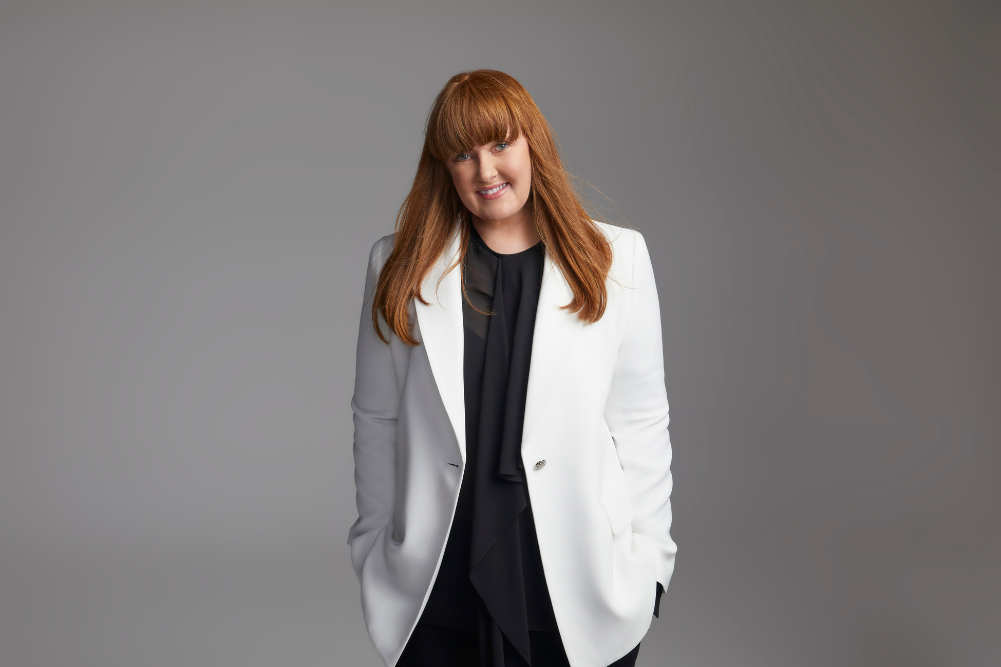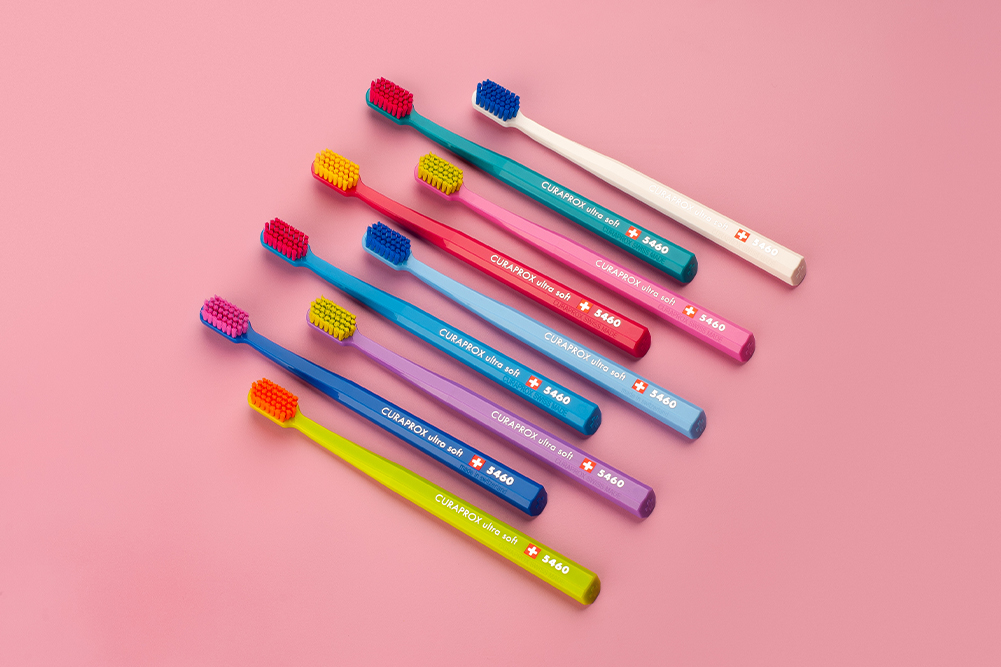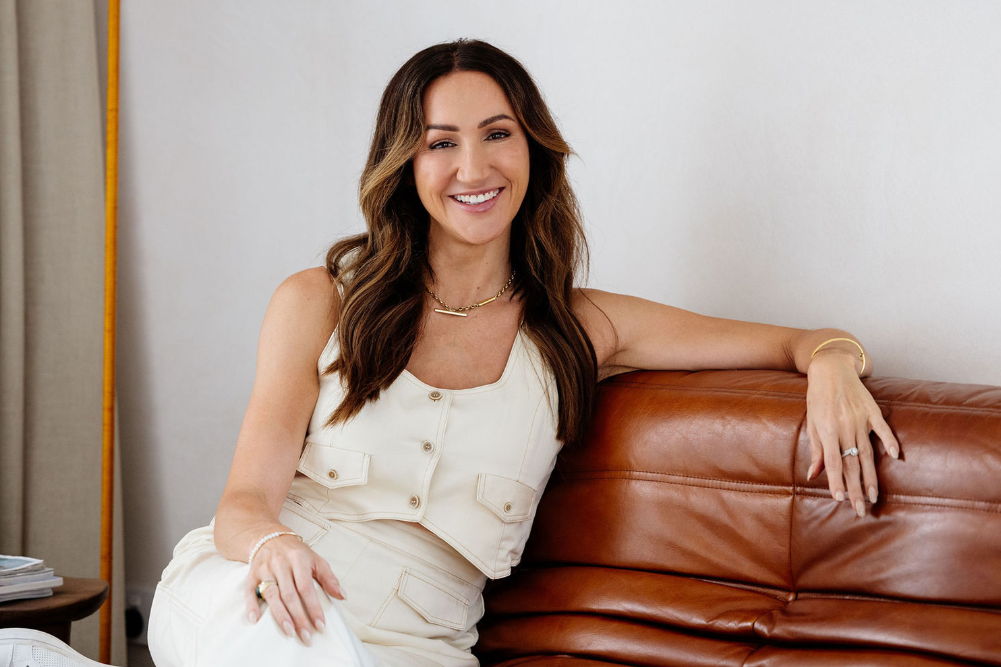Chelsea Pottenger on caring for mental health
Chelsea Pottenger, a mother, ambassador, keynote speaker and the founder and director of EQ Minds, is dedicated to reshaping the corporate landscape of mental health.
A lone vehicle was stopped in a busy lane of the Sydney Harbour Tunnel. In the heart of Australia’s biggest city, the freeway that runs under the harbour was full of commuters zipping past, oblivious to what was going on inside the car.
Security personnel approached tentatively. The car was seemingly abandoned. No one in the driver’s seat. Potential bomb threat?
What they found took them by surprise. Chelsea Pottenger was in the fetal position on the back seat, looking disorientated, and through gasps, she told them she thought she was having a panic attack. After calming her down, they towed her car from the tunnel and drove her safely home.
This was back in 2013. Fast forward 10 years, and Pottenger stands on stage in front of hundreds of people sharing her story of how she overcame some of the darkest moments in her life, not only the tunnel incident, but everything that came before and after. To date, her business EQ Minds has trained over two million people in mindfulness and mental resilience through her keynote speeches and training workshops.
The impact on those who attend her events is huge. Something about Pottenger’s story resonates with people, and she thinks it’s her openness and vulnerability that people can relate to.
One story that stands out to Pottenger happened after she delivered a talk to a financial services company. “I was walking out of the hotel room, and this guy followed me out,” she says. “He stopped me and said, ‘I was on the floor of my hotel room this morning and I was about to end my life.’” The man told her that he had an incredible home in Sydney by the water, his children were in private school, on paper his life was “perfect”, but that he was broken inside and didn’t know what to do. Despite having a flight to catch, Pottenger stayed with him, comforted him, called his wife and arranged to get him to the hospital. “A year later, he texted me and said, ‘I just want to say thank you so much for saving my life that day. I don’t think you realise the [positive] impact you’re having.’”
Baby blues
Pottenger knows what it’s like to be at rock bottom, after spiralling into the depths of post-natal depression and suicidal ideation after the birth of her daughter in 2015, two years after the incident in the Sydney Harbour Tunnel.
After trying for seven years to conceive a child, she and her husband were thrilled when she fell pregnant. But following what she describes as a “lovely” pregnancy and straightforward birth, things took a turn for the worse. Pottenger says that mismanagement of pain medication at the hospital in the days following the birth left her struggling to feed her newborn and in a lot of physical pain. “[The first] two weeks of breastfeeding was exceptionally challenging,” Pottenger recalls. “We had to put Clara [her daughter] on formula. It was a hit to my perfectionist nature. Like, I can’t even do something that my body’s ‘meant’ to do. It’s just this pressure on yourself as a high achiever.”
The new mother struggled to bond with Clara, and the shame she felt at not being able to breastfeed her daughter left her anxious, unable to sleep and feeling like a failure. The woman who had once been top of the class at school, and top performer for over a decade at her job as a medical device saleswoman, wasn’t able to meet the expectations that she felt she needed to, to be a good mother. She was consumed with feelings of inadequacy and depression, beyond simply the baby blues.
By the time her daughter was 10 weeks old, Pottenger’s mind had spiralled into dark places, until whispers of “Maybe everyone would be happier if I weren’t around” started to enter her thoughts. After experiencing another panic attack while driving, she recalls thinking, “‘I’ll do everyone a favour and I’ll just remove myself from this world,’” she admits. “I had the foresight to at least write Clara and Jay [her husband] a note just to let them know.”
But a simple question changed everything. “Are you OK, darling?” her husband asked her when she got home, his brow furrowed in concern. “And that question, ‘Are you OK?’ literally saved my life,” says Pottenger.
her husband sprang into action and contacted a family member who was a psychiatrist, and Pottenger spent the next five weeks in a psychiatric ward to heal and recover, through treatments like cognitive behavioural therapy and specialist medication.
Building a business
Towards the end of her stay, one of the psychiatrists at the hospital suggested that her empathetic nature, interest in psychology and passion for helping people might make her a good psychologist.
A few months after leaving hospital, Pottenger and her family moved from Sydney to the NSW South Coast, seeking a quieter and calmer lifestyle, and she went to university to study psychology.
After what she’d been through, her husband was happy to be the family breadwinner. “I said to Jay, ‘I really want to set up a business to help people,’” says Pottenger, “and he was a banker, so very risk-averse. He was like, ‘Maybe this is just a cute hobby. You just do whatever makes you happy. You don’t have to work ever again.’ But then this ‘cute hobby’ blew up into this big company.” So big, in fact, that by 2019, her husband was working for the company.
After doing some free speaking engagements at hospitals and Rotary clubs to build her confidence, her first big break came in 2016 when she was invited to do a workshop for eBay. Word of mouth spread about how effective her workshops were, and other companies started reaching out to her. Since then Pottenger has delivered training for brands including Uber, Google, Telstra, Mercedes-Benz and Estée Lauder.
Educate and empower
Looking back, Pottenger admits to feeling shame and stigma around how she felt as a new mother struggling to connect with her baby. It’s why she’s so proud of her role as an ambassador for Gidget Foundation Australia, a not-for-profit organisation that exists to support the emotional wellbeing of expectant and new parents to ensure they receive timely, appropriate and specialist care.
According to Gidget Foundation, perinatal depression and anxiety (PNDA) affects almost 100,000 expectant and new parents in Australia each year. Depression alone affects up to one in 10 women during pregnancy. In the first year after birth, it affects up to one in five women. Stigma is a big reason that women don’t seek help, fearful of being labelled a bad parent.
When reflecting on how new parents can try to prevent experiencing severe depression as she did as a new mum, Pottenger is an advocate for education of both partners. She says, “Both partners need to be across the signs and symptoms, not just the person carrying the baby, because you need to look aftereach other. And if that person is single, it’s their mum or dad or best mate that needs to be across this stuff. Awareness and education helps people not get into that situation in the first place.”
Future funding
But tackling stigma and advocating for education around PNDA is just the tip of the iceberg for Pottenger. She thinks there are systematic hurdles to overcome, to help all those struggling with their mental health.
According to the Australian Psychological Association, three in four psychologists in metropolitan areas have a waitlist, and one in three psychologists are unable to take on new clients. This is up from one in 100 pre-pandemic. Waitlists are
long and often clients have to wait several months before they can see a psychologist.
“We’re so under-resourced in this country,” says Pottenger, a note of exasperation in her voice. “You can’t even get in to see a psychologist or psychiatrist for about six months, let alone trying to get a hospital bed when you’re clinically exceptionally unwell.
“We’ve got a lot of awareness these days, like R U OK? Day [of which Pottenger is an ambassador], but we’ve got this backlog funnel system where all these people are now aware that they’ve got a mental illness, but they have nowhere to go. And you can’t say to someone, ‘Do you mind if you just put your suicidal thoughts on hold for about six months for me?’ That’s a real problem.”
To bridge this gap, she has tried to help people where possible, providing education through her workshops and speaking engagements with EQ Minds, through her book The Mindful High Performer, and through her podcast Recharge Your Mental Health where she shares advice, stories and guided meditations.
But for those who are at their lowest and darkest place, as Pottenger was when she ended up in hospital, she acknowledges that specialist help is key. “For those who are really [extremely] unwell, like I was, those tips won’t touch the side … Sometimes you can’t meditate your way out of depression.” For those people who need immediate help, the first step should be a visit to their doctor, who may decide that medication is an option in the interim. Helplines like Lifeline are also available for people in crisis.
The first step to solving the mental health crisis, according to Pottenger, is to secure better funding for organisations like Gidget Foundation, who are building “Gidget Houses” across Australia to provide free face-to-face counselling services to new parents, but also funding to help attract more people to study psychology and psychiatry at university so that the supply catches up with demand.
Pottenger’s end goal is to build hospitals or retreats for people to help them heal from mental health issues — places where there are psychiatrists and psychologists on site, but where people are fed wholesome organic food, surrounded by trees and nature, with access to equine therapy and doctors’ rooms that are warm and welcoming. “Places where you actually come to heal,” says Pottenger. “That’s mostly the end circle of my whole story, I suppose. And that’s still about three or four years away, to be honest. But that mission, that’s what gets me through the toughest of days. If I can impact one person positively today, that’s a really successful day.”
Triumphing over adversity
Although it often doesn’t feel like it at the time, Pottenger feels that from great struggle can come change, growth and opportunity.
“Sometimes you have to crack in this life for the light to shine through,” says Pottenger, with a smile in her voice. “I remember a monk at the Nan Tien Temple [a local Buddhist temple] said that to me. I was doing my meditation and I’m like, ‘Why do you think that this happened to me?’ and he just put his hand on me, and he said, ‘Sometimes we have to go through hardship to get to our true calling. And you’re now on your path. The right path.’”
But as with her own success story of discovering her purpose, this only comes with the perspective of time, processing and hindsight.
Reflecting, Pottenger says, “Without darkness, there cannot be light, and it’s like having that right torch to illuminate those dark times; to act more triumphantly through that … but it does take time. You can’t go through trauma and then just go, ‘Right. I’m going to grow from this.’ You can’t. You’ve got to grieve and go through the right processes, the right process of grief, and loss of identity and all that stuff.
“People can either go through post-traumatic stress after some kind of huge adversity, or they can have post-traumatic growth. I feel like through those kinds of significant changes — uncertainty and adversity — we can actually come out the other side a more evolved version of ourselves.”
If you are in crisis call Lifeline on 13 11 14.








